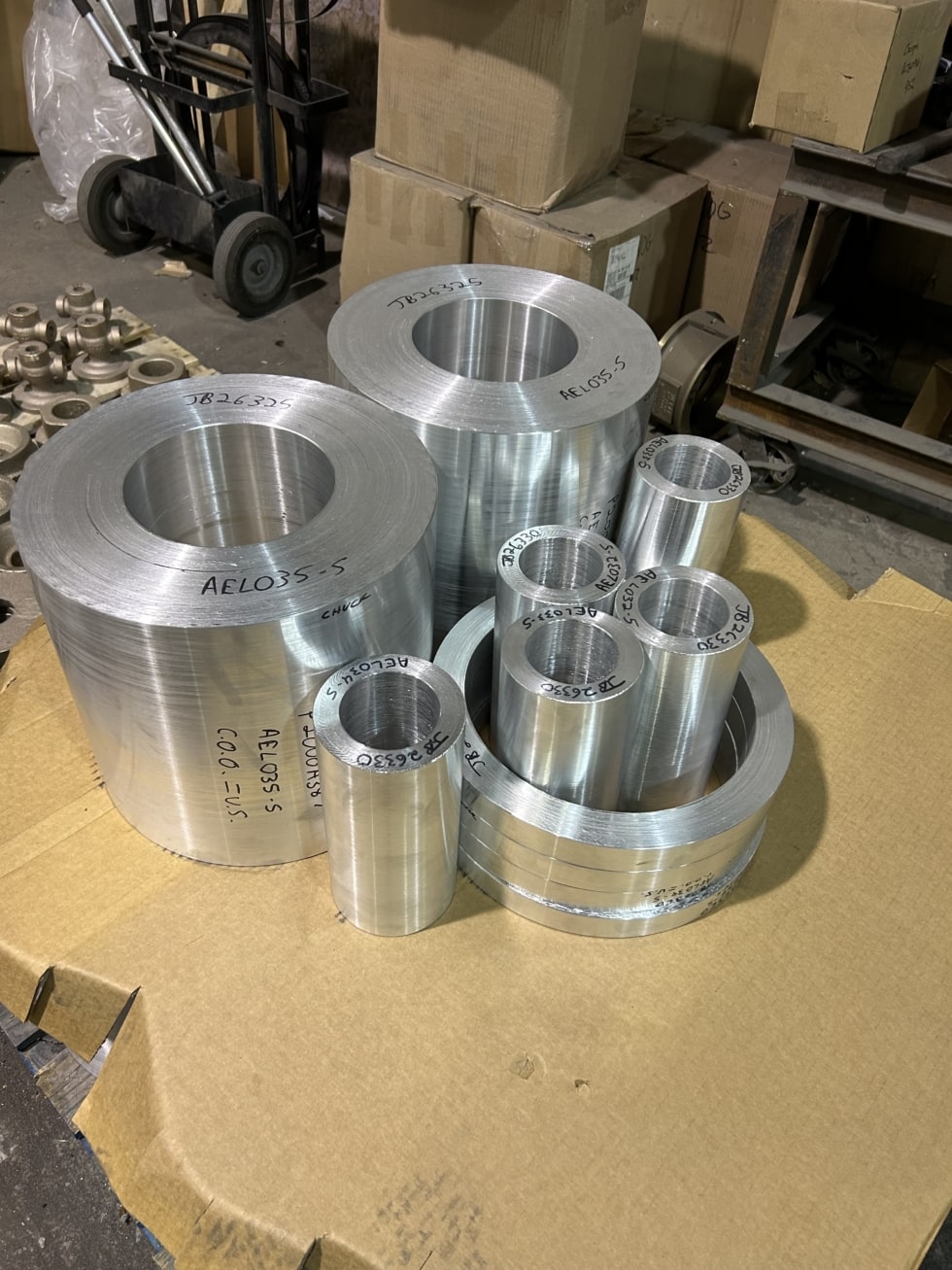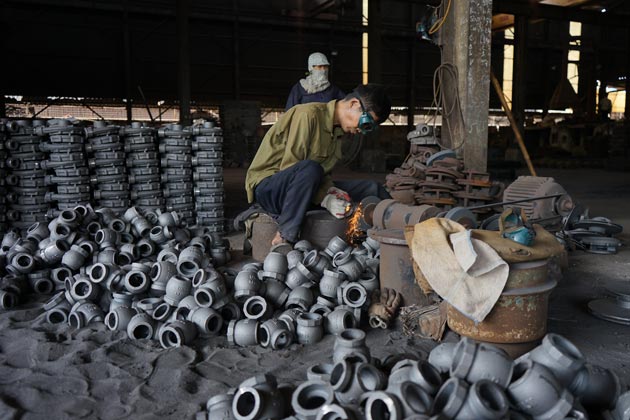Comprehending the Advantages and Innovations in the Aluminum Foundry Market
The Aluminum Foundry market plays an important function in modern production. Its lightweight properties significantly boost gas efficiency, particularly in aerospace and auto sectors. In addition, Aluminum's resistance to deterioration guarantees longevity in various applications. As the industry develops, advancements such as innovative recycling and additive production are reshaping manufacturing methods. Checking out these innovations discloses not just the advantages however likewise the difficulties ahead for Aluminum foundries in a swiftly changing market.
The Lightweight Advantage of Aluminum
Aluminum's light-weight nature supplies significant advantages across various sectors, particularly in production and transport. Its reduced density enables the manufacturing of components that are much easier to mount and take care of, resulting in lowered labor prices and improved efficiency. In the automotive industry, lighter automobiles contribute to improved fuel economic situation and reduced emissions, aligning with global sustainability objectives. In aerospace, the usage of Aluminum reduces the total weight of aircraft, which is critical for boosting performance and lowering functional prices.
Additionally, Aluminum's light-weight properties assist in innovative layouts that were previously impractical with larger materials. This adaptability enables producers to create complex shapes and frameworks while keeping architectural integrity. Generally, the light-weight benefit of Aluminum not just enhances item efficiency however additionally drives advancements in innovation and design, making it a favored product in various applications.
Deterioration Resistance and Toughness
The Aluminum Foundry industry is renowned for creating products with superior rust resistance, making them perfect for different applications. This home, integrated with boosted structural integrity, adds to the durable efficiency advantages that Aluminum components offer. Because of this, sectors increasingly depend on Aluminum to satisfy requiring ecological problems without endangering high quality.
Superior Deterioration Resistance
While numerous steels deal with substantial obstacles from ecological factors, Aluminum attracts attention for its superior corrosion resistance, making it a preferred selection in lots of applications. This property is primarily due to an all-natural oxide layer that bases on the Aluminum surface area, giving a barrier against dampness and harsh representatives. Unlike various other steels that might rust or degrade in time, Aluminum maintains its integrity also in rough environments, such as seaside locations or industrial setups. Additionally, its light-weight nature incorporated with rust resistance makes it excellent for applications in aerospace, auto, and aquatic industries. Overall, Aluminum's outstanding longevity not just enhances product longevity yet additionally minimizes upkeep costs, offering a compelling advantage for manufacturers and customers alike.
Boosted Architectural Stability
Designers and designers increasingly identify the value of improved structural stability in modern applications, where both deterioration resistance and longevity are important. Aluminum alloys, known for their light-weight homes, likewise display extraordinary resistance to rust, making them suitable for rough environments. The cutting-edge methods used in the Aluminum Foundry industry add substantially to creating parts with improved toughness. Advanced casting processes and alloy make-ups are tailored to satisfy details performance needs, guaranteeing that frameworks can hold up against severe problems without endangering honesty. Surface area treatments and finishings boost the life expectancy of Aluminum items, additionally minimizing deterioration over time. This concentrate on enhanced structural integrity not only expands the use of products yet also minimizes upkeep prices, strengthening Aluminum's placement as a product of selection in numerous sectors.
Durable Efficiency Conveniences
Durable performance in Aluminum components is mostly credited to their exceptional deterioration resistance and durability. Unlike many steels, Aluminum normally forms a safety oxide layer, which protects against corrosion and deterioration in various environments, consisting of aquatic and commercial settings. This inherent residential property substantially prolongs the life expectancy of Aluminum products, minimizing upkeep and substitute costs. Additionally, the light-weight nature of Aluminum boosts its applicability across industries without endangering toughness. The product's resistance to wear and tear additionally adds to its dependability in demanding applications, making it an optimal choice for automotive, aerospace, and building and construction markets. As markets increasingly focus on sustainability and durability, Aluminum's efficiency benefits straighten with modern-day engineering demands, solidifying its role in cutting-edge manufacturing procedures.
Environmental Effect and Sustainability
 As the Aluminum Foundry sector progresses, it increasingly focuses on environmental effect and sustainability, recognizing the demand for responsible techniques in the face of climate change. Initiatives to minimize waste and energy usage go to the leading edge, with many foundries embracing reusing efforts to redeem Aluminum scrap. This not just reduces basic material usage but likewise significantly reduces energy expense, as recycled Aluminum calls for just a fraction of the power contrasted to key manufacturing.
As the Aluminum Foundry sector progresses, it increasingly focuses on environmental effect and sustainability, recognizing the demand for responsible techniques in the face of climate change. Initiatives to minimize waste and energy usage go to the leading edge, with many foundries embracing reusing efforts to redeem Aluminum scrap. This not just reduces basic material usage but likewise significantly reduces energy expense, as recycled Aluminum calls for just a fraction of the power contrasted to key manufacturing.Additionally, innovations in exhausts control technologies are being carried out to decrease air contaminants, lining up operations with more stringent environmental laws. Foundries are also exploring alternative energy resources, such as solar and wind, to power their centers sustainably. By promoting partnership with stakeholders, the industry aims to develop innovative solutions that enhance environmental stewardship. Jointly, these efforts highlight a commitment to lowering the Aluminum Foundry's carbon footprint while advertising a circular economic situation within the manufacturing market.
Advanced Manufacturing Techniques
 Revolutionizing manufacturing processes, the Aluminum Foundry sector is progressively integrating innovative manufacturing strategies to improve performance and precision. Techniques such as computer system mathematical control (CNC) machining and additive manufacturing have actually emerged as crucial parts in maximizing production operations. CNC machining allows for high-precision part construction, significantly lowering material waste and manufacturing time. Additive manufacturing opens brand-new opportunities for intricate geometries and lightweight styles that were formerly challenging to attain.
Revolutionizing manufacturing processes, the Aluminum Foundry sector is progressively integrating innovative manufacturing strategies to improve performance and precision. Techniques such as computer system mathematical control (CNC) machining and additive manufacturing have actually emerged as crucial parts in maximizing production operations. CNC machining allows for high-precision part construction, significantly lowering material waste and manufacturing time. Additive manufacturing opens brand-new opportunities for intricate geometries and lightweight styles that were formerly challenging to attain.Additionally, the implementation of automation and robotics in Aluminum foundries simplifies procedures, decreases human error, and boosts worker security. These technologies help with an even more responsive manufacturing setting, making it possible for makers to adapt swiftly to market needs. The integration of advanced simulation software program further enhances the style and screening stages, resulting in exceptional product high quality. Collectively, these methods not just boost functional the original source performance however likewise foster technology, placing the Aluminum Foundry sector at the forefront of contemporary production.
Innovations in Recycling Processes
The Aluminum Foundry market is not only advancing in making strategies however is likewise making significant strides in reusing processes. Innovations are arising to improve the effectiveness of reusing methods, decreasing energy usage and enhancing sustainability. Advanced sorting technologies, such as computerized optical sorting, enable the recognition and splitting up of Aluminum from other products with high accuracy. This causes a better of recycled Aluminum, which is essential for maintaining the integrity of the last products.
Closed-loop recycling systems are being implemented, allowing makers to reuse Aluminum scrap within their very own manufacturing processes. This minimizes waste and advertises a round economic climate. In addition, research study into new recycling techniques, such as hydrometallurgical procedures, uses the potential for recuperating Aluminum from intricate waste streams. These innovations not just add to lowering the carbon footprint of the Aluminum Foundry market but additionally boost its economic feasibility in a significantly ecologically aware market.
Applications Across Different Industries
Numerous sectors are increasingly acknowledging the versatility and benefits of Aluminum Foundry items, resulting in extensive applications throughout sectors such as auto, consumer, building, and aerospace items. In the automotive industry, Aluminum castings add to lightweight car styles, enhancing fuel effectiveness and efficiency. Aerospace suppliers utilize Aluminum elements for their strength-to-weight proportion, necessary for airplane frameworks and components.
In building, Aluminum is favored for its toughness and resistance to deterioration, making it perfect for home window structures, roof covering, and architectural assistances. Customer goods also benefit from Aluminum Foundry items, as seen in cookware, electronics, and packaging, where lightweight and recyclable products are essential.
The adaptability of Aluminum Foundry techniques permits specific requirements and complex styles, accommodating the varied requirements of these industries. Because of this, Aluminum Foundry items are becoming integral to modern-day production processes across various industries.
Future Trends in Aluminum Foundries
As markets continue to evolve, Aluminum foundries are poised to accept several vital patterns that guarantee to improve effectiveness and sustainability. One famous fad is the raising adoption of digital modern technologies, consisting of automation and synthetic knowledge, which improve procedures and enhance quality control. On top of that, the push towards lasting practices is leading shops to buy reusing innovations, considerably reducing waste and power intake.
 Another arising trend is the usage of advanced alloys and materials, dealing with the expanding need for lightweight and sturdy components across numerous sectors This Site (Aluminum Foundry). The combination of additive production strategies is anticipated to revolutionize component layout, offering personalization and minimizing lead times.
Another arising trend is the usage of advanced alloys and materials, dealing with the expanding need for lightweight and sturdy components across numerous sectors This Site (Aluminum Foundry). The combination of additive production strategies is anticipated to revolutionize component layout, offering personalization and minimizing lead times.Cooperation with research organizations is likewise anticipated to drive advancement, as factories seek to establish brand-new procedures and products. Aluminum Foundry. Jointly, these fads indicate a transformative future for the Aluminum Foundry sector, lining up with wider goals of sustainability and performance
Often Asked Inquiries
What Are the Common Expenses Connected With Aluminum Foundry Production?
The common costs connected with Aluminum Foundry production include resources, labor, energy, tools upkeep, and overhead expenditures. These variables jointly affect the general monetary investment required for efficient Aluminum spreading operations.
Just How Does Aluminum Contrast to Other Steels in Strength?
Aluminum, while lighter than many steels, shows remarkable strength-to-weight ratios. Compared to steel, Aluminum is much less solid however supplies excellent corrosion resistance, making it a favorable selection in applications where weight and durability are crucial.
What Precaution Remain In Place in Aluminum Foundries?
Precaution in Aluminum factories usually include required personal safety tools, ventilation systems to regulate fumes, routine tools maintenance, training programs for staff members, and adherence to stringent safety laws to minimize threats get redirected here connected with molten metal handling.
How Is High Quality Control Managed in Aluminum Casting Processes?
Quality assurance in Aluminum casting processes involves rigorous inspections at different phases, including resources examination, process tracking, and end product testing. Strategies such as statistical procedure control and non-destructive testing guarantee adherence to market criteria.
What Accreditations Are Necessary for Aluminum Foundry Vendors?
The value of certifications for Aluminum Foundry distributors includes ISO 9001 for top quality monitoring, ISO 14001 for environmental monitoring, and industry-specific standards like ASTM and SAE, making sure compliance, security, and dependability in manufacturing procedures.
The Aluminum Foundry market plays a necessary duty in modern production. The Aluminum Foundry market is renowned for producing products with superior rust resistance, making them excellent for various applications. Revolutionizing manufacturing procedures, the Aluminum Foundry market is significantly integrating sophisticated manufacturing techniques to boost performance and precision. The Aluminum Foundry sector is not only advancing in producing methods yet is also making significant strides in recycling procedures. As markets proceed to progress, Aluminum shops are positioned to welcome several essential patterns that promise to enhance performance and sustainability.